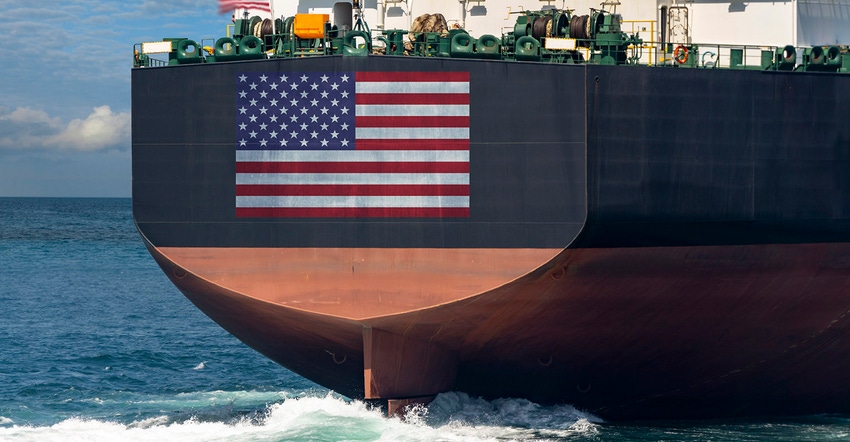
Do you know about The Jones Act? You should. It has a profoundly negative impact on your farming business.
The Cato Institute recently published Policy Analysis No. 845 The Jones Act: A Burden America can no longer bear. It is the latest in a long list of studies on a little-known federal law known as The Jones Act, a federal law that requires goods shipped between U.S. ports to be transported on ships that are built, owned, and operated by United States citizens or permanent residents.
I became interested in the Act when a client of mine said it cost over $3,000 to ship a container of soybean meal on a boat to the East Coast and it only cost him approximately $1,700 to ship the same container to Japan. The difference in price is caused by the Jones Act which restricts water transportation of cargo between U.S. ports and must be on U.S.- owned, U.S.-crewed, U.S.-registered, and U.S.-built ships.
Outdated law from First World War
The Jones Act passed after the end of the First World War. During the war the U.S. had to depend on foreign-flag vessels to move troops which some said created a weakness in U.S. national security.
U.S. Senator Wesley Jones from Washington State served as Chairman of the Senate Commerce Committee and introduced the bill that today requires moving product from U.S. port to U.S. port be on 75% U.S.-owned and 75% crewed by Americans. Furthermore, the components of the hull and superstructure must be fabricated domestically.
Sen. Jones claimed opponents of his legislation were more concerned about helping foreigners than helping American interests. Sen. Jones wanted to strengthen national security and create a strong shipbuilding industry. The Act created neither.
The Jones Act restricts foreign vessels from transporting cargo between two U.S. ports. According to the Cato report, the “…United States is the third-most restrictive among all 38 countries and the most restrictive among OECD [Organization for Economic Cooperation and Development] countries with respect to maritime freight services.”
This hurts agriculture
The movement of agricultural products has been greatly distorted by the Jones Act. For example, North Carolina and Southeastern farmers find it cheaper to import grains from other countries rather than from the American Midwest. The Mercatus Institute states “Puerto Rico farmers and cattle ranchers have imported feed grain and crop fertilizers from Canada rather than buying from New Jersey because products shipped from New Jersey to Puerto Rico were subject to higher Jones Act freight rates.”
North Carolina hog farmers are also importing soybeans and soybean meal from Brazil because Jones Act restrictions have made it more profitable to import from Brazil and Argentina than from our farms in the Midwest.
Even though the U.S. is the largest producer and second largest exporter of soybeans, parts of the U.S. find the Jones Act transport costs too high and use foreign flagged vessels to import into Wilmington, NC and Norfolk, VA. The Cato claims, “Grain and soybean farmers in the Midwest, for example, must make due with only two dry bulk ocean-going Jones Act vessels to transport their commodities.”
As we know, there are small rate differences between the costs of commodity prices on soybeans, for example, but choosing between a Jones Act carrier and a foreign carrier is not a hard choice. In fact, Jones Act transportation costs are so high that Hawaiian cattlemen have been forced to ship their cattle to Canada before sending them on to the U.S. for slaughter or on some occasions it is less expensive to “fly” their cows to the United States rather than use a Jones Act vessel.
Another example described by the Cato study involves rock salt. In the winter, Cato claims, “Maryland and Virginia, for example, obtain the product for wintertime use from distant Chile instead of domestically, despite the United States being the world’s largest producer of that commodity.”
It is time to repeal this law which impacts agriculture substantially. This will be difficult because of a 100-year accumulation of special interests, regulators and politicians seeking to benefit themselves and not the American farmer or consumer.
The opinions of the author are not necessarily those of Farm Futures or Farm Progress.
About the Author(s)
You May Also Like




